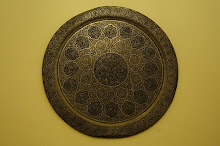All text and photos in this post are copyright John Zada and John Bell 2008
“I have a wonderful idea for a novel,” wrote a clerk of the British Information Office in Egypt, in a letter to a friend in Big Sur, California in 1944. “A nexus for all news of Greece, side-by-side with a sort of spiritual butcher’s shop with girls on slabs.”
When novelist Lawrence Durrell confided his idea to his lifelong literary confidant and friend Henry Miller, little did he know he would construct a piece-de-resistance from which all references to a city would be forever drawn. His celebrated four-decker novel, The Alexandria Quartet chronicles a city in which every international crossroads today claims some sort of lineage.
A town of auspicious, mythological beginnings, Alexandria would engender herself to every cosmopolitan soul throughout her recorded history. From the moment of her conception in the mind of her namesake, Alexander the Great, in 331 BC, foreigners flocked to her shores. Situated on Egypt’s Mediterranean coast with her back to Africa, the town fixed her gaze northwards towards Europe in a gesture of perpetual invitation.
Within decades of her construction she became lord and locus of world knowledge carrying humanity further in her first six hundred years than in all previous millennia combined. Beyond her initial burst of brilliance Alexandria would continue to radiate her eminence as the influential bride of many a conqueror. From the Dark Ages onwards, she bore witness to waves of successive invaders who parked their ships in her crowded harbours: Byzantines, Arabs, Ottoman Turks, French, and later the British.
Yet it wasn’t until the late nineteenth and early twentieth centuries that this erstwhile cosmopolis saw its latest incarnation as an international entrepot. This was the Alexandria that stoked the Durrellian imagination. That no other writer of modern fiction had before drawn upon the city’s storehouse of anecdotal riches, gave Alexandria yet another new form in which to be realized.

As colonial avatar, Durrell’s Alexandria was a confluence of agendas. It was where British soldiers and bureaucrats refined and executed their imperial designs, and where merchants from across the Mediterranean came to make their fortunes. In her souqs and on her palm-lined esplanades, English, French, Arabs, Italians, Greeks, Armenians and Jews all intermingled in a dizzying frenzy of work and play; churning an economy that thrived on the exchange of gossip and goods.
Day and night, the city seethed with intrigues. It was in its sweltering heat mitigated by a northwest breeze that “Monty” planned and won the war in North Africa. Where writers like E.M. Forester and Constantine Cavafy immortalized a decadent epoch through their respective brands of myth-making. Every word spoken, every move made, during this time, later became a nostalgia to be clung to by her aging denizens.
Yet, this was but one Alexandria. Despite her modern renaissance, this city of pashas and aristocrats was but a mere approximation, an unconscious and fleeting parody of an earlier self. For entombed beneath the concrete of the modern town, were the undisturbed remains of one of the greatest cities the world had ever seen. This, the Alexandria of antiquity, brought together all previous crossroads, setting the standard for every great international city that would follow in her wake.
The Alexandria of the ancients was a civilization unto herself -- an epicenter of human achievement. Within her boundless parameters thrived a people devoted to scholarship, invention, technology, commerce and leisure. Today, this memory echoes as an endless catalogue of peoples, personages and achievements. Her success was predicated upon the wiles of Egyptian priests, Greek aristocrats, Jewish merchants, Persian middlemen, and Phoenician sailors. Visitors from Iberia to India to sub-Saharan Africa came to explore the city’s bi-ways. From the labyrinthine crypts of the city’s great library come to us the calculations of her immortalized savants: the geography of Strabo, the astronomy of Hipparchus, the mathematics of Euclid. Flourishing side-by-side with this rigorous scholarship was a mélange of pseudo-sciences that operated with unprecedented freedom: Gnostics, neo-Platonists, and Hermetic philosophers shared the city’s pulpits with the cults of Mythra, Isis, Christ and Yahweh – to name but a few. Without doubt, Alexandria was an interzone par excellence - a powerhouse of civilization - where every idea, philosophy and project coalesced into perfection.
Yet, the passing of time would exact its inevitable toll. Today Alexandria stands as little more than a maritime suburb of Cairo. Squalid, dusty and ghost-ridden, she exists as a husk of laundry-bannered tenements and European motifs held captive by the hinterland she had always rejected. Upstaged as a seaport, much of the traffic to-and-from the town nowadays enters and exits from the desert to her rear – perhaps the greatest indication of her tragic descent into irrelevance. Even the reincarnation of her legendary library in the architecturally savvy Bibliotheque Alexandrina (a structural epitaph to a bygone moment) inspires the pathos of a past utterly unattainable.
But from Alexandria’s poignant decay comes the glory of a life lived to its fullest. She remains the original exemplar of the international crossroads whose legacy resides in her many progeny in which so many of us today call home. Whether or not she is to be re-born, is left purely to Providence. In the meantime she sleeps, forever exuding the past beneath that same Mediterranean breeze.

















